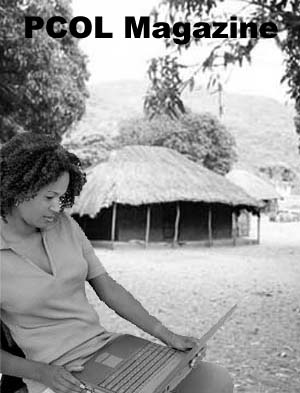
Website Policy for PC-Eastern Caribbean, as authored by Volunteer Advisory Council Reps and Administration, 2004
Peace Corps-Eastern Caribbean Website Policy
As in the Volunteer Handbook
5/11/04
Electronic Communication and Volunteer Websites: Volunteers must use discretion and judgment when using Peace Corps and non-Peace Corps-owned computer equipment. This is of particular importance when communicating via e-mail and the Internet, which has potential for mass distribution. Volunteers are free to discuss their role in the Peace Corps with any individual or group, but they should recognize that ill-considered statements could be used to embarrass themselves, the host country in which they serve, the Peace Corps, or the United States. Material that might be viewed as disparaging to the host country or as politically sensitive by the host government could create significant problems for the Peace Corps program in that country. The care taken in private communication should be no less than the care taken in public utterances; messages to friends and family or the contents of web pages may be passed to the press or others and become a public issue. Volunteers should take into account the Peace Corps policies regarding publication of materials, political expression, and other related issues in this section above when they use IT systems and services, such as e-mail and posting material to the Web. A violation of such policies could result in administrative separation or other disciplinary action.
In addition, Volunteers should be aware of the potential for violation of U.S. privacy, host country, or other applicable laws if they include in any electronic communication (via e-mail or a web page) detailed personal information about others, such as full names or addresses, without the specific prior permission of those individuals. In addition, Volunteers could potentially violate such laws if they transmit information that could be defamatory in nature regarding another individual. Similar restrictions may apply to the unauthorized transmission or posting of a person’s photograph or likeness. Social security numbers should never be posted on a Web site or transmitted via e-mail, under any circumstances.
Volunteers who create their own Web sites, or post information to Web sites that have been created and maintained by others, should be reminded that (unless password-protected) any information posted on the Internet can probably be accessed by the general public, even if that is not intended. Because search engines regularly index most sites on the Internet, it is possible that members of the public could locate a Volunteer Web site by searching for information about the Peace Corps or a certain country. This is possible even if the Volunteer does not actively promote his/her Web site. Given these realities, Volunteers are responsible for ensuring that their IT use is consistent with the following guidelines:
• Notification: Volunteers who create their own Web sites or post material to Web sites created by others are responsible for discussing the content in advance with the Country Director to ensure that the material is suitable and complies with this general guidance as well as any country-specific guidance.
• Disclaimer: Any web site maintained by a Volunteer during his or her Peace Corps service must reflect the fact that it is not an official publication of the Peace Corps or the U.S. Government. The site, therefore, must be labeled clearly and prominently with an appropriate disclaimer such as: "The contents of this Web site are mine personally and do not reflect any position of the U.S. Government or the Peace Corps."
• Use of the Peace Corps Logo: Because use of the Peace Corps logo is reserved for official activities authorized by the Peace Corps Act, the logo cannot be used on Volunteer Web sites.
• Cultural Sensitivity: The thoughtful and accurate insights that Volunteers convey in their communications with others can contribute substantially to bringing to the United States a better understanding of other countries. However, given the broad access to Volunteer-posted material on the Web, both in their country of service and elsewhere, Volunteers should remain culturally sensitive with respect to the material they post to any Web site. Volunteers should be reminded that people in their host countries and members of the U.S. public may make inferences about the Peace Corps or the Volunteer’s country of service based on the material a Volunteer posts to a Web site. Volunteer-posted material on the Web should not embarrass or reflect poorly on the Peace Corps or the countries where Volunteers serve.
• Safety and Security: As a safety precaution, Volunteers are urged to omit from their Web sites information about their precise living location or those of other Volunteers, as well as information about events to be attended by a large number of Volunteers. For example, Volunteers who live in remote areas should use care before placing the name of their towns or villages on their Web site and, instead, should refer to the general area of the country where they live. For their own protection, it is also advisable not to provide information about Volunteers’ personal possessions. Volunteers should be aware of the risk of identity fraud and other security concerns connected with the posting of any personal information about themselves, family members and others on Web sites.
• Publication Policies: Consistent with Peace Corps’ policy regarding publications, Volunteers may not accept payment for anything they write or photograph that appears on the Web. Articles, manuals, teaching materials, and other work-related products developed in connection with Peace Corps service and/or financed by Peace Corps funds are considered part of the public domain and may not be copyrighted or used for personal gain. Volunteers should be advised that posting materials to the Web that they have not authored or created may violate U.S., host country, or other applicable copyright laws.
Volunteer Contributions to Peace Corps’ official Web Sites: The Office of Communications, which oversees the Peace Corps’ official external web site (http://www.peacecorps.gov), welcomes the submission of essays, stories, and photographs from Volunteers that will assist in highlighting Peace Corps activities to prospective applicants and the general public. All submissions should be reviewed by the Country Director and forwarded to the Office of Communications for consideration.




